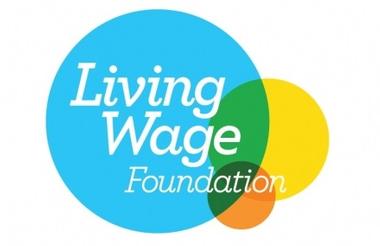Kirsty Weakley investigates why charities have a problem paying the real living wage.
We’ve seen this week that, perhaps contrary to many people’s assumptions, the charity sector is far from leading the way when it comes to paying its staff a real living wage. This makes uncomfortable reading for many in the sector, so what should be done about it?
On Monday we revealed that just 14 of the largest 100 charities are signed up for accreditation by the Living Wage Foundation. This compares with one third of FTSE 100 companies who are signed up.
Progress appears to have been slow. The last time we looked at how many members of the haysmacintyre / Charity Finance 100 Index had Living Wage Foundation accreditation was in 2014, when the figure was nine. So in three years only five of the country’s largest charities have been convinced to pay their staff fairly and publicly back the campaign.
And yesterday the Living Wage Foundation’s own research found that just over a quarter of workers across the charity sector as a whole say they are not paid the real living wage. Again the charity sector lags behind the wider economy, where 21 per cent of employees earn below the real living wage.
The risk here is that charities are not leading the way and are allowing others to set the narrative.
Benefits
Advocates of the real living wage say that there are benefits for both employers and employees.
For employees the benefits are obvious - they earn enough to meet the cost of living. But there are also benefits for employers. The Living Wage Foundation has carried out research among the organisations signed up to its scheme and found that signing up had improved the reputation of those businesses, staff motivation, and relationships between managers and staff.
Most charities which pay the real living wage say that they do so because it is in line with their broader charitable objectives, and is essentially the right thing to do.
Kathy Taylor, director of people at Macmillan Cancer Support said: “People who work at Macmillan should expect a salary that enables them to live to a good standard, and not have to worry about where money for the next bill is coming from.
“As a charity supporting people with cancer, we know this disease can have a profound impact on someone’s finances, and we want people to experience financial security in both sickness and health.”
Complying without seeking accreditation
When Civil Society News contacted all the charities in the haysmacintyre / Charity Finance 100 Index to ask if they were or were not accredited with the Living Wage Foundation, and why, seven replied to say that they either meet or exceed the Living Wage Foundation’s threshold, but that they have not sought formal accreditation.
One of these was Citizens Advice. Steve Whitehead, director of people and equality, said: “Citizens Advice goes above and beyond the requirements of the Living Wage Foundation. We pay all staff more than the Real Living Wage and offer additional benefits such as enhanced annual leave, generous parental leave and an employee assistance programme."
Meanwhile, back in the summer of 2014, RNIB’s then chief executive, Lesley-Anne Alexander tweeted that her organisation had agreed to become a living wage employer, so it was a little surprising to discover that the charity was not on the list of accredited charity employers.
Last week a spokesman told Civil Society: “While we're not an accredited employer, we do make sure we pay our employees the Living Wage and the London Living Wage, recognising the importance of reasonable pay for the most junior members of our team. This has meant that we've made above-inflation increases for junior staff over the last few years."
Other charities which claim to pay the real living wage to staff, but which have not sought accreditation, include Marie Stopes International, Royal Opera House Covent Garden, Motability, Guide Dogs and WaterAid.
Considering accreditation
Eight charities said that they were looking at the possibility of becoming accredited, with various levels of enthusiasm for the task.
Nuffield Health described moving towards paying the real living wage as a “longer-term” ambition.
Meanwhile a spokeswoman for the International Rescue Committee’s UK arm said that her charity plans to achieve accreditation within the next year.
“IRC UK pays all interns and staff the London Living Wage or above and this policy came into force in August 2015,” she said. “We are not currently accredited with the Living Wage Foundation, mainly owing to capacity issues amid the rapid growth of this office, but achieving accreditation is firmly on the agenda for this financial year.”
Similarly a spokesperson from Islamic Relief UK, said: “All of Islamic Relief’s UK staff are paid well above the National Living Wage, and our goal is for all staff to earn the Real Living Wage. We aspire to being accredited by the Living Wage Foundation as we value all of our staff and the contribution they make to our humanitarian work.”
The British Film Institute said it was in discussions the the Living Wage Foundation but cited its “extensive” range of suppliers and contractors, who would also need to be paid a real living wage, as an obstacles.
Tearfund said it was in the process of becoming accredited and that all staff already earn the level required.
Constrained by contracting
A big challenge for charities that deliver public services and rely on contracts from local authorities is that they rely on how much the commissioner is prepared to pay. Charities working in social care are faced with trying to change a system which has been built upon low pay.
A spokeswoman for the National Autistic Society told us: “Affordability is a key challenge for our charity as it is for other providers in the care sector, but it is a key priority that our salaries reflect the value of the work our staff do to support autistic adults and children.
“We are committed to becoming an accredited living wage employer across the UK which is why we now pay above the living wage in Scotland and are working to implement pay and retention plans that move all our lowest paid staff in England, Wales and Northern Ireland from the current position, where they earn above the statutory living wage, towards the voluntary living wage.”
We had a similar response from other social care charities when we asked similar questions three years ago. This suggests that little progress has been made.
The Living Wage Foundation’s research found that 45 per cent of people working in residential care earn below the real living wage rate.
However, there is a decent cohort of health and social care charities which do have accreditation, accounting for 37 per cent of charities sligned up with the Living Wage Foundation. This could be because where the sector is able to pay above the legal minimum, it is keen to highlight that as a way of distinguishing itself from other providers.
Friendly Funders campaign
Over 30 charitable foundations are currently signed up to the Living Wage Foundation’s Friendly Funders scheme, including the Joseph Rowntree Foundation, the Barrow Cadbury Trust and Comic Relief.
This means that any roles that they fund are funded at the real living wage rate. They must also pay their own staff the real living wage.
The Welsh Council for Voluntary Action (WCVA) announced on Monday that it had joined the scheme.
It is the first funder based in Wales to join and Ruth Marks, chief executive, said: “Many of the third sector organisations in Wales that we work with support people through issues connected with ‘in-work poverty’ and wider social challenges including health, mental health, transport, housing and digital inclusion.
“The living wage is a positive movement for our society, in particular for our members and the third sector. WCVA is extremely proud to both pay the Living Wage to its staff, and be able to support other organisations to provide a fair wage through our funding schemes.’
Confusion and awareness
Based on the response to our questions, it appears that there is an element of confusion about the difference between the government’s mandatory national living wage for those aged 25 and over, which came into force last year. and the Living Wage Foundation’s higher, voluntary threshold.
It is understandable that the similarity in the names has caused some confusion, and incidentally makes it difficult to write about the issue in a concise way.
Some charities simply told us that while they were not accredited by the Living Wage Foundation, they did pay the national living wage - this is the statutory minimum so if they were not meeting this they would be in breach of the law.
Jane White, head of employee services at Cancer Research UK, said: “Our income to achieve our ambition of beating cancer sooner relies on vital donations from the public and we have a duty to maximise the percentage of income spent directly on our life-saving work. Our staff are key in helping us achieve this goal.
“We aim to offer salaries that attract and retain the best talent while ensuring appropriate levels of charity expenditure and all of our employees earn at least the national living wage set by the government.”
Nuffield Health said that the introduction of the national living wage rate meant that over 2,000, out of more than 13,000, employees received a pay rise.
One charity even said that they were not aware that it was possible for their type of organisation to become accredited.
Do the right thing
In its report yesterday, the Living Wage Foundation called for a “comprehensive package of solutions” and a “collaborative approach with funders, charities, commissioners and employees working together” to address the issue of low pay in the charity sector. It is calling for an action plan and hopes to work with the sector to develop one.
From our own analysis we can also see that many of the largest charities are failing to lead the way. Charities must not only do the right thing, they must be seen to do the right thing.
At the moment it appears that the private sector is picking up the mantle. But it’s not too late for the sector to seize the initiative and start shaping the debate. If the unaccredited charities which told us they were meeting the Living Wage Foundation’s standards were to sign up formally, the picture could be very different next year, even before we consider those who are working towards meeting the threshold.
This issue speaks to a wider issue relating to public trust. People expect charities to be better and more ethical than other sectors, that is why is always a disappointment if they realise that charities are not meeting these lofty expectations.
But charities should not do the right thing in the hope that they will beat the private sector, or come top of an imaginary league table. They should do the right thing, loudly and proudly, because it is the right thing to do.
Related articles











